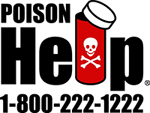The Internet Can Literally Make You Sick
In the event of a poison exposure, every second counts. The longer it takes to sift through pages of search results online, the greater the danger of negative health effects.
By: Debbie Carr, MEd
Thursday, March 21, 2013

Years ago, the use of Ipecac was encouraged to induce vomiting if a poisonous substance was swallowed. Now, with new medical information available, experts actually discourage its use due to the serious dangers associated with its misuse. However, on the Internet, numerous sources still vouch for its effectiveness. In a panic, many people will click on the first seemingly reputable option presented to them. The inaccuracy of that information can actually result in a much more dangerous situation.
Because of the unique and complex nature of poisons, it's vital that exposures are handled on a case-by-case basis. Factors like weight, height, medical history, and in some cases even geography, can drastically change the outcome of an exposure. The Internet may offer a wealth of information, but the experts at local poison centers are the best source for specifically tailored information.
Calls to the Poison Help line at 1-800-222-1222 connect people to specially trained nurses, pharmacists, toxicologists and doctors who are certified in poison information. Poison centers provide free and confidential health care services 24 hours a day, seven days a week.
In the event of a poison exposure, every second counts. The longer it takes to sift through pages of search results online, the greater the danger of negative health effects. A mistreated exposure can escalate an easy in-home treatment into a trip to the hospital.
Calling a poison center is like calling a really smart, charismatic, caring family member, minus the judgment and gossip-spreading. The voice on the other end of the line is a medical professional who has undergone years of training and rigorous testing just to qualify to answer your questions. In fact, 20 percent of calls to poison centers are from doctors, nurses, and other health care professionals who are seeking specialized treatment advice that only experts at poison centers can answer.
Calls to the Poison Help line keep millions of people out of the hospital each year. Ninety percent of people who call a poison center are able to be treated at home with the phone support and advice of a poison expert. If immediate medical attention is needed, the expert on the line will send an ambulance and alert the receiving hospital of the incoming patient's condition and recommend treatment.
While a quick web search may seem like an easy option, it's no substitute for speaking with medical experts in real-time.
In his timeless wisdom Mark Twain once said, "Be careful about reading health books. You may die of a misprint." Over 100 years later, during America's 51st National Poison Prevention Week beginning March 17th 2013; the nation's 57 poison centers are working hard to save us all from dying of a misprint.
To learn more about the Poison Help line and your local poison center, call 1-800-222-1222 or visit http://www.aapcc.org/.
Debbie Carr is the executive director of the American Association of Poison Control Centers which supports the nation's 57 poison centers in their efforts to prevent and treat poison exposures.